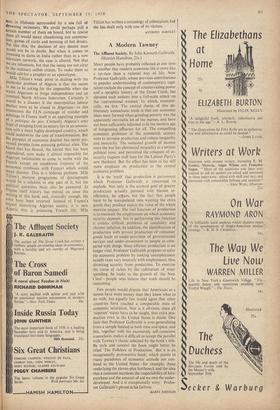A Modern Tawney
The Affluent Society. By John Kenneth Galbraith. (Hamish Hamilton, 21s.)
MOST people have probably reflected at one time or another that modern economic life is more like a rat-race than a rational way of life. Now Professor Galbraith, whose previous contributions to popular understanding of contemporary capi- talism include the concept of countervailing power and 'a sprightly history of the Great Crash, has elevated such notions into a full-scale attack on the 'conventional wisdom' by which, economi- cally, we live. The central theme of this de- liberately iconoclastic book is that our economic ideas were formed when grinding poverty was the apparently inevitable lot of the masses, and have not been sufficiently adjusted to fit the modern age of burgeoning affluence for all. The compelling economic problems of the nineteenth century were to increase production and reduce inequality and insecurity. The sustained growth of income since the war has eliminated inequality as a serious political issue, and permitted the conquest of in- security (sapient stuff here for the Labour Party's new thinkers). But the effect has been to lay still more emphasis on production as the central economic problem.
It is the 'myth' that production is paramount which Professor Galbraith is concerned to explode. Not only is the avowed goal of greater production actually pursued with blatant in- efficiency, he argues, but the fact that people have to be manipulated into wanting the extra goods they produce makes the value of the whole exercise suspect. The real function of production is to maintain the employment on which economic security depends; but in performing this function it creates difficult problems of instability and chronic inflation. In addition, the identification of production with private production of consumer goods leads to under-provision of governmental services and under-investment in people as com- pared with things. Since efficient production is no longer vital, Professor Galbraith proposes to solve the economic problem by making unemployment benefit rates vary inversely with employment, thus divorcing security from. produCtion. To exorcise the curse of riches by the cultivation of wiser spending, he looks to the growth of 'the New Class'—people who believe that work should he interesting.
Few people would dispute that Americans as a nation have more money than they know what to do with; but equally few would agree that other countries have reached a comparable state of economic saturation. Nor is it obvious, since all 'superior' wants have to be taught, that extra pro- duction even in the United States is otiose. One feels that Professor Galbraith is over-generalising from a sample limited in both time and space, and this, together with his excessively self-conscious iconoclasm, makes it difficult to accept the parallel with Tawney's classic solicited by the book's title. By style and content the book might better be titled 'The Folklore of Production.' But it is an exceptionally provocative book, which points to many paradoxes of economic altitude not con- fined to the United States—for example, those underlying the eleven-plus bottleneck and the idea that a recession increases the respectability Of hire- purchase and the amount of aid we owe the under- developed. And it is exceptionally witty : Profes- sor Galbraith's phrase is his fortune.
HARRY JOHNSON


































 Previous page
Previous page